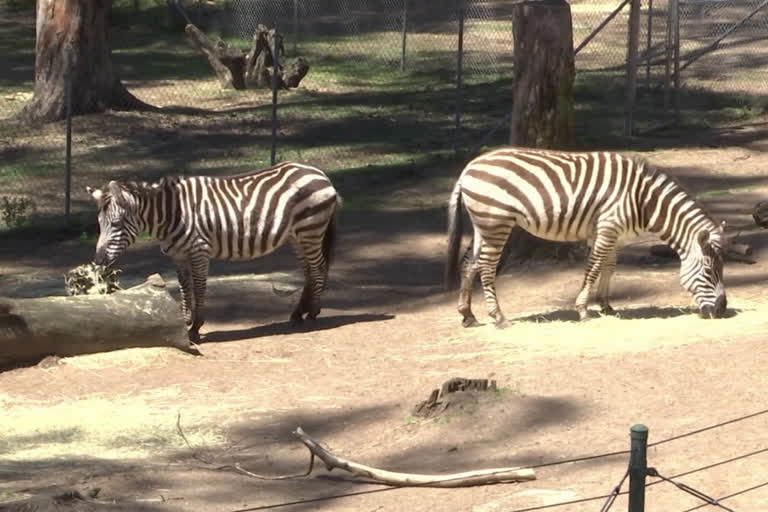Oakland: The coronavirus lockdown is creating a financial crisis for US zoos, which have closed to visitors, their chief source of revenue.
But unlike other businesses, they can't just lock up and leave. They still have the expensive job of caring for animals.
At the Oakland Zoo in California gibbons howl and zookeepers munch on vegetation. But even the animals know something's missing: human visitors.
The coronavirus lockdown is creating a financial crisis for US zoos, which have closed to visitors, their chief source of revenue. The coronavirus pandemic has forced zoos to close their doors to the public, creating a financial crisis that's led to layoffs, furloughs and pay cuts for employees.
"We've never seen anything like this. And to be completely shut down, to have to make so much of our staff stay home and shelter in place, to not be able to do what we do best, which is engage with the visiting public - it's had a major financial impact, but it's also really just not who we are," says Joel Parrott, Oakland Zoo President.
Unlike other businesses shuttered by shelter-in-place orders, zoos must still feed and care for their animals - their biggest expense - even though they have no visitors, their biggest source of revenue.
Read Also:Remote islands offer remote-control tourism
"They can't just send their employees home and turn off the lights and lock the doors. They have to care for animals," says Dan Ashe, President of the Association of Zoos and Aquariums.
All of the association's 220 US zoos and aquariums, which typically host more than 200 million people annually, are now closed, Ashe says. A recent survey found more than 60 percent have laid off or furloughed employees.
About 60 percent of its members have applied for assistance from the US federal government's Paycheck Protection Program, part of the coronavirus relief package that's intended to limit layoffs at small businesses and nonprofit organizations.
The zoo association is hoping to get more financial aid for its members in the next coronavirus stimulus bill, which is currently being negotiated by Congress.
Read Also:Coronavirus could complicate Trump's path to reelection
The Oakland Zoo has laid off more than 100 employees who primarily work with guests. Visitors account for more than 90 percent of its revenue through spending on tickets, concessions, rides, gifts and parties, says Parrott.
But the zoo still has more than 200 other employees who care for animals as well as administer, maintain and protect the facility,
In early April, the zoo moved its remaining employees to a three-day working week.
"We've had to, first of all, do a layoff of the part-time employees and the seasonal employees, the ones that are only here for the when the visiting public's here. We did institute at the beginning of April a furlough program."
It recently brought them back full-time - at least until June - after it qualified for Paycheck Protection Program.
To generate new revenue, the Oakland Zoo has started an online subscription program that gives customers access to daily behind-the-scenes videos with animals and zookeepers. It costs USD 14.95 a month, USD 9.95 for zoo members.
To protect its employees and animals against COVID-19, the zoo has adopted new measures, says Colleen Linzley, the zoo's director of animal care, conservation and research: "We're wearing masks if we're within six feet of each other or many of our animals that are more sensitive and potentially able to get the COVID-19 disease. And of course, we're doing a lot more disinfecting, particularly of high-touch areas."
The animals have noticed the lack of zoo visitors, Linzley says. Shyer species are venturing more into areas they avoided when guests are around, but many animals, particularly primates, appear to miss their visitors.
"So it's really interesting how some of those shyer species are using their habitat different differently during the day. But then other species are very interested in zoo guests and kind of use zoo guests as part of their enrichment, the stimulation in their environment."
(With inputs from AP)
